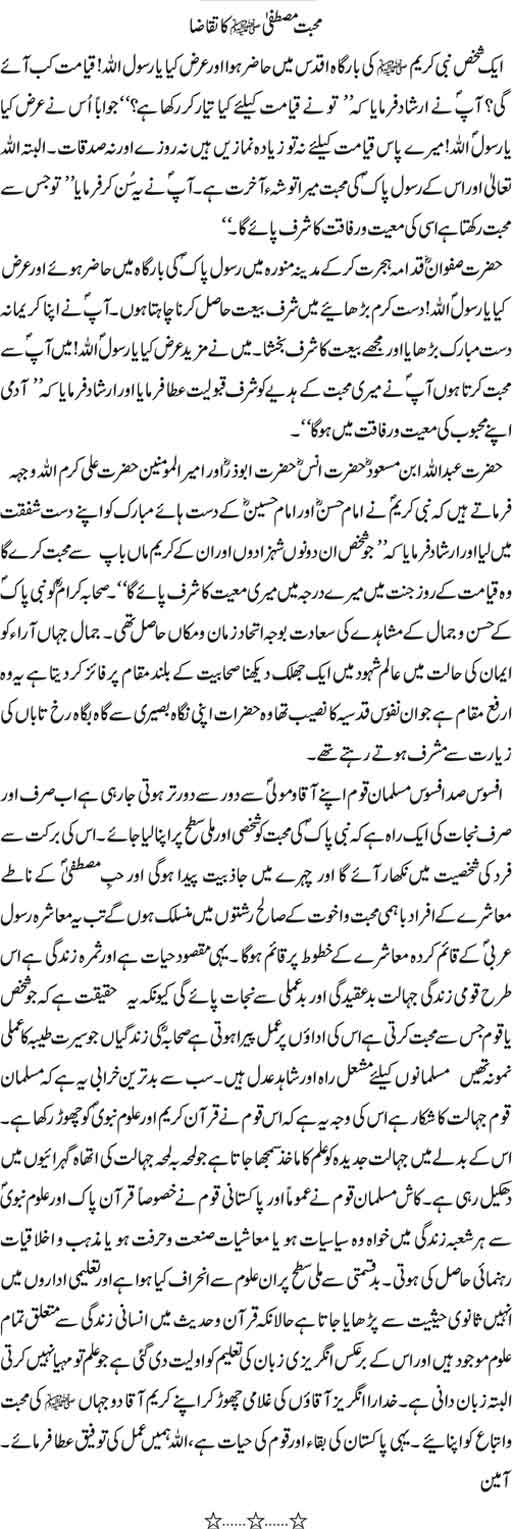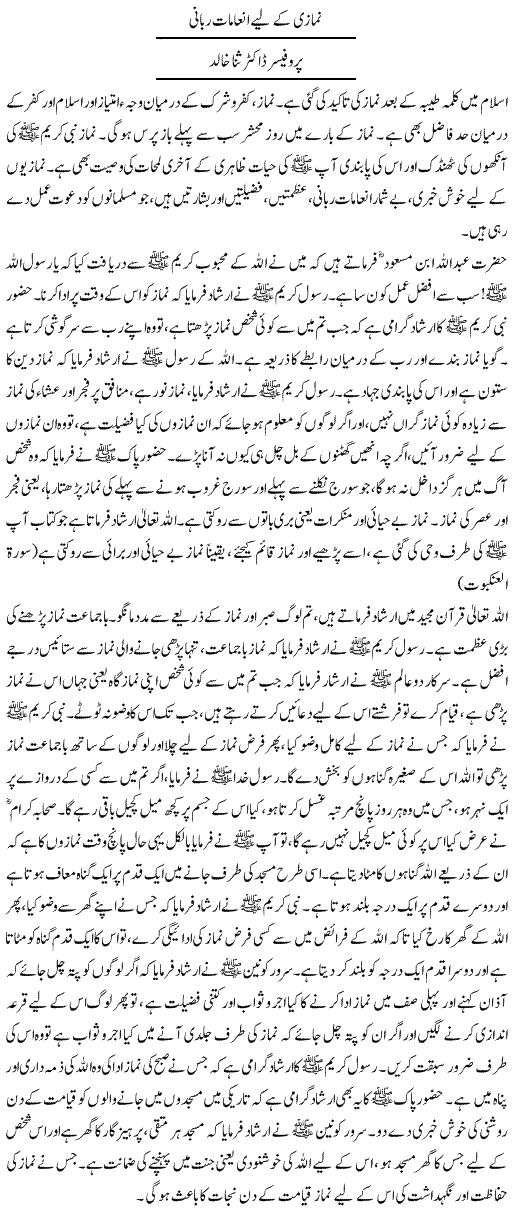
Khwaten Aur Hijab
Effect Of Nearness To The Holy Prophet Sallalaahu Alaihi wasallam On Iman
Another Gem from Sahih Muslim
Sahih Muslim Book 37, Number 6623:
Hanzala Usayyidi, who was amongst the scribes of Allah’s Messenger (may peace be upon him). reported: I met Abu Bakr. He said: Who are you? He (Hanzala) said: Hanzala has turned out to be a hypocrite. He (Abu Bakr) said: Hallowed be Allah, what are you saying?
Thereupon he said: I say that when we are in the company of Allah’s Messenger (may peace be upon him) we ponder over Hell-Fire and Paradise as if we are seeing them with our very eyes and when we are away from Allah’s Messenger (may peace be upon him) we attend to our wives, our children, our business; most of these things (pertaining to After-life) slip out of our minds.
Abu Bakr said: By Allah, I also experience the same. So I and Abu Bakr went to Allah’s Messenger (may peace be upon him) and said to him: Allah’s Messenger, Hanzala has turned into a hypocrite. Thereupon Allah’s Messenger (may peace be upon him) said: What has happened to you?
I said: Allah’s Messenger, when we are in your company, we are reminded of Hell-Fire and Paradise as if we are seeing them with our own eyes, but whenever we go away from you and attend to our wives, children, and business, much of these things go out of our minds.
Thereupon Allah’s Messenger (may peace be upon him) said: By Him in Whose Hand is my life, if your state of mind remains the same as it is in my presence and you are always busy in remembrance (of Allah), the Angels will shake hands with you in your beds and in your paths but, Hanzala, time should be devoted (to the worldly affairs) and time (should be devoted to prayer and meditation). He (the Holy Prophet) said this thrice.
Here are a few things to be noted from this wonderful Hadith from Sahih Muslim
1) When the companions of the Holy Prophet Muhammed Sallalaahu Alahi wasallam were there in his presence they could ponder over heaven and hell as if it were right in front of their eyes, but when they left his company to go for business, or attend their family affairs the effect would go away, nearness to the Holy Prophet Muhammed Sallalaahu Alahi wasallam has such a big effect on a Muslim, the same also pertains to other servants of Allah who are lesser in status like the Awliya , who derived their spiritual guidance through the nearness to the Holy Prophet Muhammed Sallalaahu Alahi wasallam, nearness to them and visiting them has a huge effect on Imaan.
2) All acts which bring you closer to him and help you maintain a Qalbi roohani attachment to him also bring benefit
3) One must not always be engrossed in worship and should also attain to his work and family affairs.
Tanveer Pasha
Muhabat-e-Mustafa Kay Taqazeey

Muhabat-e-Mustafa Kay Taqazeey
Benefits Of As-Salaam Alaikum
1.”As-Salaamu Alaikum” is a means of immense reward
A man passed by the Messenger of Allaah (Sal Allaahu Alaihi wa Sallam) while he was sitting with others, and said “As-salaamu ‘alaykum.”
The Prophet (Sal Allaahu Alaihi wa Sallam) said, “[He will have] ten hasanaat.”
Another man passed by and said “As-Salaamu Alaikum wa Rahmatullaah (peace be upon you and the mercy of Allaah).”
The Prophet (Sal Allaahu Alaihi wa Sallam) said, “[He will have] twenty hasanaat.”
Another man passed by and said “As-Salaamu Alaikum wa Rahmatullaahi wa Barakaatuh (peace be upon you and the mercy of Allaah and His blessings).”
The Prophet (Sal Allaahu Alaihi wa Sallam) said, “[He will have] thirty hasanaat.”
2.”As-Salaamu Alaikum” is an aspect of Imaan
Once a man asked the Prophet (Sal Allaahu Alaihi wa Sallam) about which aspect of Islam was best. The Prophet (Sal Allaahu Alaihi wa Sallam) replied: “Feeding the hungry, and saying salaam to those you know and those you don’t know.” (Bukhaari and Muslim)
3. “As-Salaamu Alaikum” is a means of entering Jannah
The Prophet (Sal Allaahu Alaihi wa Sallam) said: “You will not enter Paradise until you believe, and you will not believe until you love one another. Shall I not tell you about something which, if you do it, you will love one another? Spread salaam (the greeting of peace) among you.” (Muslim)
4. “As-Salaamu Alaikum” gets rid of sins
The Prophet (Sal Allaahu Alaihi wa Sallam) also said, “When two Muslims meet (give salaam), and shake hands, they are forgiven their sins before they part (with each other).” (Abu Dawud)
5. “As-Salaamu Alaikum” is the greeting of the people of Jannah
“Then, those that feared their Lord shall be driven in companies into Paradise. When they draw near its gates will be opened, and its keepers will say to them: “Salaamun ‘Alaikum” (Peace be upon you), you have done well. Enter and live in it forever.” (Surah Zumar:73)
Namazi Ke Liye Inamat e Rabbani

Namazi Ke Liye Inamat e Rabbani
Prayer Is Better Than Sleep
When young Muslims meet others for the first time and find out that they are Muslim, often one of the very first questions they ask each other is, “Do you pray?” It’s as if this is their touchstone to see if the person they have met is a real Muslim or not. Calling yourself Muslim is one thing, being a Muslim is something else.
Praying five times a day is at the heart of Islam. It is one of the things that distinguishes a Muslim from everyone else in the world; that all the activities of life can be made significant by the cycle of prayer and praise which we offer to Almighty Allah. So why, then, do we have such a problem being faithful to prayer?
My first Umrah was one of the most important experiences of my life and it had its effects on me. Being so close to the Kaaba was a deeply moving experience. Being at the very place where our beloved Prophet (peace be upon him), like all the prophets before him, had walked and prayed, was amazing.
One of the things that hit me most about being in Makkah, among so many others, was when the call to prayer sounded for Fajr, the Dawn prayer. Thousands of people appeared from every direction and headed toward the Kaaba for prayer.
Getting up in the middle of the night wasn’t difficult at all, because the experience of praying at the Kaaba was so moving. At the time, moving with the vast crowd, I couldn’t help thinking about what it is usually like back home.
Those getting up and going to the mosque for the dawn prayer are certainly a minority, aren’t they? Away from Makkah, it is all too easy to ignore the Adhan completely and stay in the comfort of one’s bed.
At special times like Ramadan, or when we go on pilgrimage, it seems so much easier to be faithful to prayer and to take Islam so much more seriously. How many of us, for example, attended Tarawih Prayers in the mosque during Ramadan, even though we might occasionally miss one or two of the obligatory prayers?
It’s one of life’s paradoxes that we want so much to be good, and yet we find ourselves falling into the same old traps and doing things we later regret. How odd we are as human beings! We can quite happily sit in front of the television for hours or sit idly chatting on the Internet to no one in particular, yet we can’t manage to set aside 10 minutes to pray.
Hurmat And Tazeem Muharram

Hurmat And Tazeem Muharram
Muharram – One Of The Four Sacred Months
Muharram’ is the first {1st} month of the Hijri calendar and is one of the Four [4] sacred months concerning which Allah {Aza wa Jall } says in the Quran:- ‘Surely the number of months with Allah is twelve {12} months in Allah’s ordinance since the day when He created the heavens and the earth, of these four being sacred; that is the right reckoning; therefore be not unjust to yourselves regarding them. [Source:-Quran ~Surah 9 At-Taubah, Verse # 36]
‘Muharram’ is one of the four{4} sacred Months out of twelve. The others are… Zul-Qa’dah, Zul-Hijjah, and Rajab. These four { 4 }months have been sacred since the creation of the universe.
Allah {Aza wa Jall } says in the Quran:- Muharram is a sacred month because Allah made it sacred along with three{3} other months and told us about it in the Quran. Prophet Muhammad {may peace be upon him} informed us about the Four {4}sacred months in the following narration:-
‘The year is of twelve {12}months, out of which four{4} months are sacred:
Three{3} are in succession …
#1/ ~Dhul-Qa’ da.
#2/~ Dhul-Hijja.
#3/~Muharram.
#4/ ~ Rajab.
[Source:- Bukhari Vol 004, Book 054, Hadith # 419]
‘Ashura’~ [meaning tenth [10th ] in Arabic] {The 10th of Muharram}
Fasting on the 10th of Muharram Ashura was obligatory for Muslims before the fasts of Ramadan were obligatory.
Narrated by the Mother of the Believers Aisha (Allah be pleased with her):- The people used to fast on ‘Ashura’ {the tenth (10th)day of the month of Muharram} before the fasting of Ramadan was made obligatory. And on that day the Kaaba used to be covered with a cover. When Allah made the fasting of the month of Ramadan compulsory…
Allah’s Apostle {may peace be upon him} said:- ‘Whoever wishes to fast (on the day of Ashura) may do so, and whoever wishes to leave it can do so. [Source:-‘Bukhari’ Vol 02, Book 026, Hadith # 662]
The Fast of Ashura expiates the sins of the previous year and the coming year.
Abu Qatada al-Ansari (Allah be pleased with him) reported that….. The Messenger of Allah {may peace be upon him} was asked about fasting on the day of Ashura {10th of Muharram} at which point he said:- It expiates the sins of the preceding year. {Source:-Muslim: Book 06: Hadith # 2603}
Syedna Usman e Ghani (Razi Allah Tala Anho)

Syedna Usman e Ghani (Razi Allah Tala Anho)
Janwaroon Se Husn-e-Salook

Janwaroon Se Husn-e-Salook

